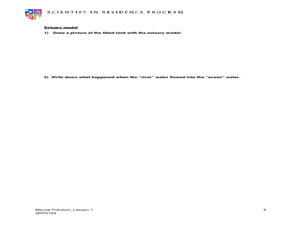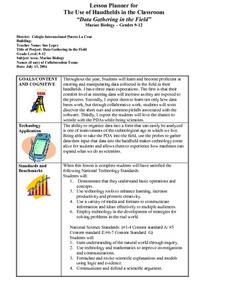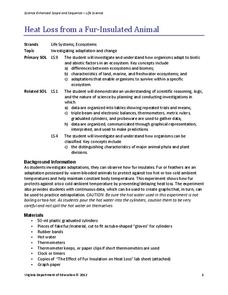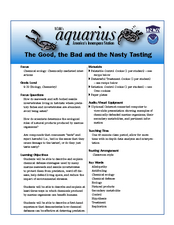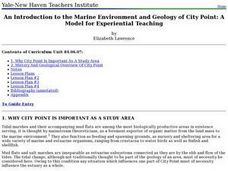Curated OER
Adaptation and Diversity on Sheffield Island
Written for an exploration of shoreline ecosystems on Sheffield Island, this gives ecology or marine biology buffs a hands-on experience. Using GPS or visual triangulation techniques, they lay transect lines on a high and a low energy...
Curated OER
Bycatch
Bycatch is the unwanted and discarded marine life caught during commercial fishing. Young marine scientists review bycatch litigation and analyze graphs of bycatch data and answer questions about it. This raises awareness while...
Curated OER
Rubber Duckies and Ocean Currents
Students explore marine life by conducting a rubber duck experiment. In this water currents lesson, students practice identifying latitude and longitude coordinates on a map and define the currents of major oceans. Students discuss the...
Curated OER
The Magic School Bus Goes to Mussel Beach
Students participate in a hands-on activity where they explore tidal zones. They explore tides and marine life. This is an experiment that can be accomplished in class.
Project WET Foundation
Discover Our Ocean
A very informative interactive presents ocean zones, estuaries, hot water vents, phytoplankton, coral reefs, sea turtles, kelp forests, and all things that thrive in the ocean.
Curated OER
Marine Debris on the Chesapeake Bay
Students use website to study estuarine debris data. They study the density of marine debris.
Curated OER
Modeling Estuaries
Students create a model estuary. In this modeling estuaries lesson, students identify characteristics and mix water of varying densities. Students form a hypothesis, conduct an experiment, and analyze the results.
Curated OER
The Nature of Science
In this nature of science worksheet, students identify four statements as "pure" or "applied" science and they read a short story about an experiment performed by a boy. They identify various components of the experiment...
Curated OER
Human Impact on the Life Cycle of Corals
Students study the life cycle of a coral reef. They then participate in a simulated village meeting in which they roleplay various characters who must review proposed legislation dealing with reef management.
Curated OER
Using Environmental Models to Determine the Effect of Acid Rain on an Ecosystem
Demonstrate to your middle school science learners how chalk breaks down in a weak acid. Discuss what affects acidic rain might have on ecosystems. Lab groups then choose one of two questions: "How does acid precipitation affect an...
California Academy of Science
Fish Prints
What do a dead fish, conservation, and paint have in common? The answer is a great lesson about fish anatomy, fun print making techniques, and unsustainable fishing practices. The class will start by making fish prints with a...
Curated OER
the Journey of the Pacific Salmon in the Open Ocean and Fishing
Third graders discuss salmon and their life cycle. In this salmon life cycle lesson, 3rd graders recognize the difficulties researching the life cycle of salmon as they migrate. Students conduct an experiment and create a game.
Curated OER
??Data Gathering in the Field??
Students demonstrate that they understand basic operations and concpets, students further use technology to enhance learning, increase productivity and and promote their creativity. Students gain an understanding of the world through...
Virginia Department of Education
Heat Loss from a Fur-Insulated Animal
How do animals adapt to weather changes? Provide your class with the ability to understand adaptations and body temperature as they participate in this hands on experiment, using fake fur and hot water. Pupils collect data and...
Curated OER
Marine Field Trip to Whytecliff Park
Students study the intertidal habitat, tidal pools and the organisms that live in them. For this aquatic ecosystems lesson students take a field trip and experience first hand the local seashore environment.
Curated OER
Plankton / Phytoplankton
High schoolers discuss the importance of plankton in the ocean ecosystem. In this biology lesson, students identify the different types plankton by observing them under the microscope. They explain how plankton population affect global...
Curated OER
Collect Data Using a Transect Line
Learners learn about transect lines through a study of marine debris. For this marine debris lesson, students calculate the items on a transect line and graph them. Learners complete a category worksheet.
Curated OER
The Good, the Bad and the Nasty Tasting
Learners examine the effect of chemicals from marine plants or animals on predator's preferences. In this ecology lesson, students conduct taste tests and collect necessary data. They write their conclusion after analyzing...
Curated OER
Comparison of Protein Sequences From Two Samples of Crabmeat Using Gel Electrophoresis As an Introduction To the Biotechnology Lab
Young scholars discover that proteins that are the product of DNA translation are different for different species. They determine that by analyzing their mass and charge they can differentiate between two different species. They use some...
McGraw Hill
Arthropods
Are spiders related to crabs? Study the order of arthropods with a reading selection about animal diversity. It provides details about each class within the order, as well as vivid pictures and explanatory charts.
Curated OER
An Introduction to the Marine Environment and Geology of City Point: A Model for Experiential Teaching
Students begin the instructional activity by researching the history of City Point, Connecticut. Using a map, they color areas they were asked to find and discuss why the areas are important to the community. As a class, they are shown...
Curated OER
Boston Harbor Cruise: A Shoreline Survey
The students take a harbor cruise, photograph, and draw shore line features attending to evidence of human impact/consequences, and its cost on marine/land animal habitats vegetation, weather patterns, signs of erosion, and the water...
Curated OER
Nature Superfish
Students examine the billfish as a predator in the ocean. In this ocean, creatures, and tides lesson, students view video clips and discuss the sea creatures and scientists in the videos. Students create their own videos. students...
Curated OER
Stream Study
Young scholars study the characteristics of a stream habitat. In this life science lesson plan, students use sieves, nets, and jars to collect aquatic organisms. Young scholars also measure the temperature of the stream and calculate the...








